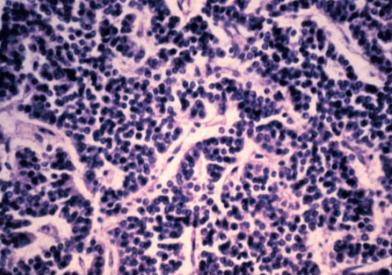What Are Carcinoid Tumors?
Carcinoid tumors are neuroendocrine tumors that can develop in the appendix, gastrointestinal tract, or lungs. We sometimes find them in the appendix after removal of the appendix because of appendicitis.
- The majority of carcinoid tumors in children are small, slow-growing, and benign (noncancerous). In rare cases, these tumors can grow more quickly and spread to other sites in the body.
- About 10% of patients with multiple endocrine neoplasia type 1 (MEN1) develop carcinoid tumors.
At Dana-Farber/Boston Children's Cancer and Blood Disorders Center, we treat and care for children with carcinoid tumors through our Endocrine-Oncology Program. The team includes specialists in pediatric oncology, endocrinology, genetics, and surgery. They work together to develop a personalized treatment plan for your child's situation.
Causes and Symptoms of Childhood Carcinoid Tumors
As a parent or caregiver, you want to know what may have caused your child's tumor. Some carcinoid tumors are linked to inherited conditions, such as MEN1. However, most carcinoid tumors appear with no known cause.
A carcinoid tumor's symptoms may vary from child to child. They will depend on the tumor location and type. The most common symptoms include:
- Abdominal pain due to appendicitis. Most cases of appendicitis, however, are not related to carcinoid tumors.
- In rare cases, children may develop carcinoid syndrome, with symptoms such as redness in the face and neck, rapid heartbeat, difficulty breathing, a sudden drop in blood pressure, and diarrhea. These symptoms come from hormones produced by the tumor and rarely occur except in advanced cases.
Because many of these symptoms can also point to other conditions, if you notice one of the symptoms, talk to your doctor immediately.
How We Diagnose Childhood Carcinoid Tumors
We will perform several diagnostic tests to identify the size, location, and type of tumor and confirm the diagnosis. These tests may include advanced imaging studies, biopsy, and blood and urine tests. Molecular testing may also be done to determine whether the tumor is linked to specific genes.
After completing all necessary tests, our experts meet to review and discuss what they have learned about your child's condition. We will then discuss the results and outline the best treatment options with you and your family.
How We Treat Childhood Carcinoid Tumors
Treatment for your child's carcinoid tumor will depend on the type of tumor your child has and whether it is malignant (cancerous).
Your child's doctor may recommend:
- Surgery: Surgery may involve a biopsy and removal of the entire tumor and nearby tissue.
- Radiation therapy: This treatment uses high-energy rays from a specialized machine to damage or eliminate cancer cells and shrink tumors. We often use radiation therapy together with surgery, either before or after the removal of the cancer.
-
Chemotherapy: We may use chemotherapy, a drug treatment that aims to destroy or shrink cancer cells, before or after surgery.
Different groups of chemotherapy drugs work in different ways. Often, we will use a combination of chemotherapy drugs. Your child may receive chemotherapy:
- Orally, as a pill to swallow.
- Intramuscularly, as an injection into the muscle or fat tissue.
- Intravenously, as a direct injection into the bloodstream or IV.
- Intrathecally, as a direct injection into the spinal column through a needle.
While chemotherapy can be quite effective in treating certain cancers, the drugs cannot differentiate normal healthy cells from cancer cells. As a result, there may be adverse side effects during treatment. Being able to anticipate these side effects can help the care team, child, and family prepare for, and in some cases prevent these complications from occurring.
After treatment, your child will receive continued care through our pediatric cancer survivorship programs. We will provide a comprehensive follow-up medical evaluation each year. We also offer patient and family education, psychosocial assessment, genetic counseling, and opportunities to connect with other childhood cancer survivors.

